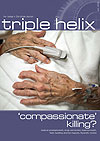'We don't do God', said spin doctor Alistair Campbell. 'Keep religion out of politics' proclaimed Australian opposition leader Mark Latham. (1) A Google search on 'Keep God out' brings up 99,600,000 references with California, Canada, Haiti, Irish law, public affairs, government, our democracy, stem cell research and football all prominent. As the General Election approaches we will hear similar sentiments – not least from those who feel they have something to lose from 'the Christian vote'. And there will no doubt be warnings not to 'go the American way' by allowing moral issues to become election issues.
But in fact morality is at the very heart of politics – ideological convictions ultimately drive most politicians and inform public policy. Ideological convictions are in turn informed by personal values and a person's worldview. God is of course already intimately involved in politics. God establishes governing authorities, and holds them ultimately accountable. (2) Our political leaders therefore need our prayers 3 but God has also given us a part to play in who actually exercises civil authority. Each of us, before God and in good conscience, must make our own decisions about voting; but we need to ensure we exercise our votes wisely, thoughtfully and in an informed way. In Spring 2005 CMF News (4) I raised ten questions – apart from health, education, crime and the economy – that Christian doctors might ask candidates at the last general election, and with a few (but not many) modifications I shamelessly do so again.
1. Euthanasia.
How will you ensure that euthanasia is not legalised in this country?
Margo MacDonald MSP's End of Life Assistance (Scotland) Bill is entering the committee stage and a new bill is expected in Westminster just after the election.
2. Abortion.
What will you do to stem the tide of abortions?
With seven million 'legal' abortions since 1967 and 200,000 per year, it is tantamount to abortion on demand. Where do your local candidates stand on 'upper limits', extension to Northern Ireland, abortion up to birth for disability, and government policy to offer all parents the eugenic choice to eliminate children with genetic disease before birth?
3. Embryo-destructive research.
Will you seek to repeal existing laws and prevent further liberalisation?
The government decision in the 2008 HFE Act to permit more pre-implantation diagnosis, parentless embryos and wider boundaries for embryo research was unnecessary, dangerous and morally wrong. Animal-human hybrids have already become a farcical footnote in history, while ethical alternatives such as cord blood remain chronically underfunded.
4. Sexual health.
What is your policy to arrest the spread of STIs?
With a national epidemic of STIs, unplanned pregnancy, tubal infertility and cervical cancer, we still relentlessly pursue failed 'harm reduction' policies like condoms, morning-after pills and more STI clinics, excluding measures such as abstinence based sex education and promoting marriage.
5. Poverty and Health.
How will you ensure justice in healthcare for the developing world?
Britain still gives only a fraction of the internationally agreed minimum of 0.7% of GDP in overseas aid; plunders trained health professionals from the developing world; and engages in unjust economic trade practices through subsidies, tariffs and encouraging indebtedness.
6. Freedom of worship.
How will you ensure that Christians are able to practise, share and defend their faith without being prosecuted? So-called 'equality and diversity' legislation and policy have led to major threats to the freedom to pray, evangelise, exercise Christian conscience, and even express a Christian opinion in hospitals, businesses and local government.
7. Marriage and family.
What will you do to affirm, protect and support the traditional family?
Marriage and the family are fundamental for a stable society; but their status and stability are being eroded by easy divorce and by removing support for the traditional family unit relative to other 'models'.
8. Addiction.
How will you act to reduce alcohol, nicotine, drug and gambling addiction?
Present policy is aimed more at harm reduction than at restricting access (through price control) and effecting behaviour change.
9. Obesity and Inactivity.
What will you do to encourage the general population to adopt a healthy diet and get regular exercise?
10. Marginalised groups.
How will you ensure that vulnerable groups like the elderly, the mentally ill, ethnic minorities and asylum seekers receive an adequate basic level of healthcare and are not marginalised in healthcare allocation?
I warmly recommend helpful resources on the websites of Evangelical Alliance, (5) CCFON, (6) CARE, (7) and the Christian Institute. (8) The last contains a comprehensive past record of current MPs' voting records on key issues. Let's put God back on the political agenda.
































